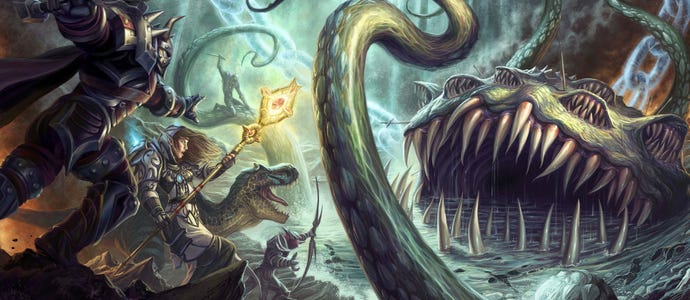Questing for Heroism in MMOs
Eurogamer's Richard Cobbett argues that MMO dungeons are more rote challenges than heroic fantasies.
This article first appeared on USgamer, a partner publication of VG247. Some content, such as this article, has been migrated to VG247 for posterity after USgamer's closure - but it has not been edited or further vetted by the VG247 team.
Richard Cobbett, Eurogamer
Dungeons and raids are usually the most exciting part of any MMO, but there's still depressingly little heroism to be had in most of them.
To be fair, there's a tiny sliver of time when this isn't the case -- when a new dungeon arrives in, say, World of Warcraft, and teams have to go face its bosses and other challenges without a convenient wiki on hand. Those early days can be amazing.
Almost immediately though, heroism goes from defying the odds to merely consulting them; of not simply going in to pit a party's skill against the latest threat to their world, but having the Dummies Guide To Killing This Guy under one arm. Worse, the expectation of this knowledge brings out the worst in the average MMO player, who has usually seen everything a hundred times and just wants to get to the end to get their shiny whatever.
Not only does this breed hostility towards new players, thanks to far too many old hands forgetting the time they served at the business end of the learning curve, it produces a vicious cycle where design increasingly has to be built around efficiency rather than actual adventure. The descent can be seen best in WoW, which started with dungeons of a comparable size and scope to a standard RPG, but inevitably got whittled down to little but a few boxes for bosses and corridors full of trash mobs. If anything, it's a wonder players still tolerate those.
Almost immediately, heroism goes from defying the odds to merely consulting them.
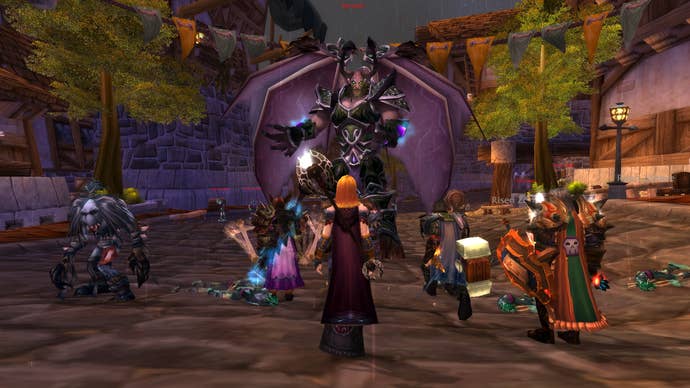
The problem for developers is that every move to address this has had a negative reaction. Dungeon finders and looking-for-group tools sound like a great idea, but in practice they produce groups with no sense of camaraderie or tolerance. Playing with difficulty, a game will either alienate the side of its player base that wants loot or the side that wants a challenge, because going for the middle ground never pleases anyone. Every player type inevitably assumes they're the core audience for the game, whether they're hardcore raiders or casual players who never do anything but follow a solo-focused personal storyline (whose recent popularity is in itself a painful reminder that most MMOs fail miserably at making players feel invested via their USP).
This makes dungeon design inherently tricky. Millions of people like them just as they are, and that's fine -- though it's worth remembering that this is a self-selected group assembled over a decade or so of MMOs Just Working Like This and thus to at least some degree invested in the status quo. Still, there should be some ways to improve it, and a good starting point would be better matchmaking. Gear level and skill are completely different things, especially factoring in players with multiple characters, and new players learning the ropes together usually beats tagging along with a team that already intimately knows exactly what has to be done at every point.
More dramatically, it's time to consider whether or not we actually need the huge, expansive worlds any more, and whether they're getting in the way of the multiplayer experiences that players can't get anywhere else. One of the common complaints about LFG tools is that they turn worlds into lobbies, so we're already halfway to ditching them. Moreover, most of the time the huge expense in creating extra space is little more than padding anyway, with players routinely claiming that the endgame is the 'real' game and even popular releases tending to become ghost towns rather than thriving fantasy kingdoms shortly after launch.
It's time to consider whether we actually need the huge, expansive worlds any more, and whether they're getting in the way of the multiplayer experiences.
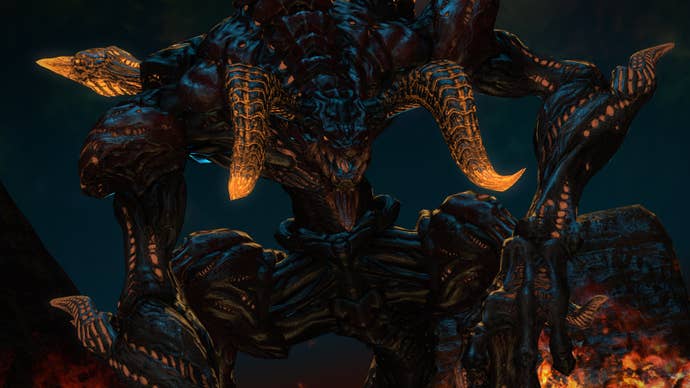
Maybe it's time for dungeons and raids to stand alone, with players following the classic Dungeons & Dragons "You all meet in an inn" template and simply teleporting to interesting places without all the wandering and FedEx questing getting in the way. It's not as though there aren't games like Skyrim that offer more involving solo experiences than any MMO ever will.
The big advantage there would be allowing designers to better cater to all tastes, but there are smaller ones too -- a much easier basis for Neverwinter-style player-created content, for instance, where a team can come together, or be assembled from around a single town, hit a 'random' button and get a hand-crafted but still fresh test of skill. Long dungeon crawl? Quick hack-and-slash? As long as the content kept flowing, there'd be plenty of choice, turning an evening in a dungeon with friends into something more like joining them for a game of Dota.
By thinking in game terms rather than world simulation terms, there's also a lot more scope to set things like daily challenges, mutators and bounties for specific enemy types, which should encourage even the efficiency-minded players to keep moving around.
Maybe it's time for dungeons and raids to stand alone, with players following the classic Dungeons & Dragons "you all meet in an inn" template.
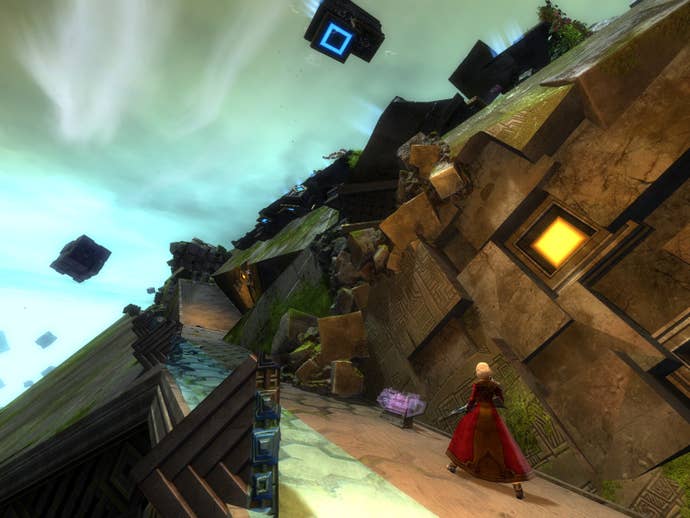
What I'd like to see most though is an element of surprise value, ideally tied to the players involved. Making a dungeon feel heroic is primarily about achievement rather than narrative, with long, complicated stories getting in the way as soon as even one player knows what's coming. There are ways to work a more dynamic personal story in though, like having groups that players have enmity with show up during a dungeon to back up the usual mobs, as well as scope for easy last-minute carpet pulls like swapping the boss for someone unexpected. Better still, we could have the first proper MMO roguelike, which it really seems like we should have seen by now.
The core of the problem though is that no experience where victory is guaranteed can be seen as heroic, which is what dungeons and raids inevitably become after a while. People don't typically keep playing them because the experience is so good, but because the game design forces repetition and replay long past the point that everyone's kitted out well enough to be able to snooze through the supposedly epic challenges but still has to keep grinding through them to make a few numbers go up a bit.
There's no arguing that it's worked over the last few years, but as even World of Warcraft's numbers slip and the genre as a whole faces competition from elsewhere, this is a great time to go back to the drawing board and make sure that the most social, the most challenging, the most potentially impressive part of the experience can still pull its weight - even when it's not bribing players to endure it.
Pete Davison, USgamer
I thought I'd expand on a few of Richard's points here from my own personal experience -- specifically with regard to Final Fantasy XIV which, if you missed it, Mike and I reviewed here.
The Sunken Temple of Qarn is tough but fair, relying as much on player skill as it does on knowing what the appropriate strategies are.
As both Mike and I noted in our review, Final Fantasy XIV plays it relatively safe when it comes to its overall game structure, with the usual zone-based open world supplemented by instanced dungeons and raids. As Richard says above, however, there are also a few pieces of content that are much snappier than your average dungeon -- the Primal battles (or "Trials," as the game calls them) are a good example, boiling down to nothing more than a single boss fight without any padding, as are the Guildhests, which are mini-dungeons made up of no more than one or two encounters designed to give you training in working together as a party.
I wanted to give one specific example that jumped out at me, though, because it provided a degree of proof that you can still have thrilling "heroic" experiences in dungeons even when at least one of your party members is a walking wiki article.
I am referring to the dungeon called the Sunken Temple of Qarn. Those who have been playing Final Fantasy XIV for a while now will doubtless be well familiar with this notorious place already, but for those who are not, allow me to give a bit of context.
Qarn is a level 35 dungeon. This places it reasonably high up the ladder -- the level cap in FFXIV is currently 50 -- but it's by no means an "endgame" challenge, as there are a number of later dungeons and Trials for players to take on. It is, however, notorious for being one of the most difficult, challenging dungeons in the whole game -- and it does so by being tough but fair, relying as much on player skill as it does on knowing what the appropriate strategy for each boss is.
It achieves this in what you might consider to be a rather cheap manner -- by putting you at risk of dying rather frequently. The main place this comes from are a number of bee-like enemies that swarm around the dungeon, and which have a devastating attack called Final Sting that usually incapacitates anyone unfortunate enough to get hit by it. Cheap, you might think, until you realize that there are several important considerations about Final Sting: firstly, it's clearly telegraphed by the enemy in question; secondly, it's predictable, since it only happens when the enemy is close to death; thirdly, it can be interrupted either by an appropriate ability or simply by ensuring the beast is dead before it finishes charging. Fail to deal with it and you'll suffer; succeed in dealing with it and you'll breathe a sigh of relief.
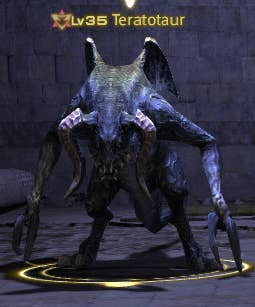
By the time you reach the first boss (right), you're probably feeling pretty confident about dealing with these bees, which is when Qarn throws some additional considerations at you. Not only do you have to deal with a large boss monster, but you also have to contend with it summoning low-HP versions of these very same bees that can kill you in an instant. Not only that, but the boss quite frequently casts Final Fantasy mainstay spell Doom, which causes your character to immediately die as soon as a timer runs out. Fortunately, the bees can be easily dispatched with considerably less damage than their counterparts out in the main dungeon, and Doom can be dispelled by standing on whichever of the three platforms in the boss' chamber is currently glowing, so all the tools for success are already in place -- you just have to use them and, more importantly, concentrate. Hard.
I was running the dungeon with three guildmates, a couple of whom had tackled Qarn before, while I and another of my companions was a newbie. We died six times on this first boss and eventually ended up running out of time for the dungeon because the last boss featured a similar degree of skill-based gameplay that we spectacularly failed to live up to, but none of us got angry or frustrated. As those last few seconds ticked down and our "DUTY FAILED" message flashed across the top of the screen, we laughed and commiserated with one another; sure, we hadn't beaten the challenges of Qarn, but we'd had a damn fun time in the process. That particular session will always, for me, be far more memorable than any number of runs where everything goes perfectly smoothly.
One of the things that I like so much about Final Fantasy XIV is that it provides a great mix of "comfort food" gaming where you can rush through without having to think too hard, and genuinely challenging content like Qarn or the Primal battles. Not only that, but the game's "level sync" feature, whereby if you're too high-level for something the game just cuts you down to size the moment you enter, means that all of the game's content is always relevant, particularly if you're playing with a good Free Company or group of friends who are all at different levels.
Richard is on point with his piece above, but heroism isn't quite dead yet. You just have to seek it out yourself, much like a good adventure.
